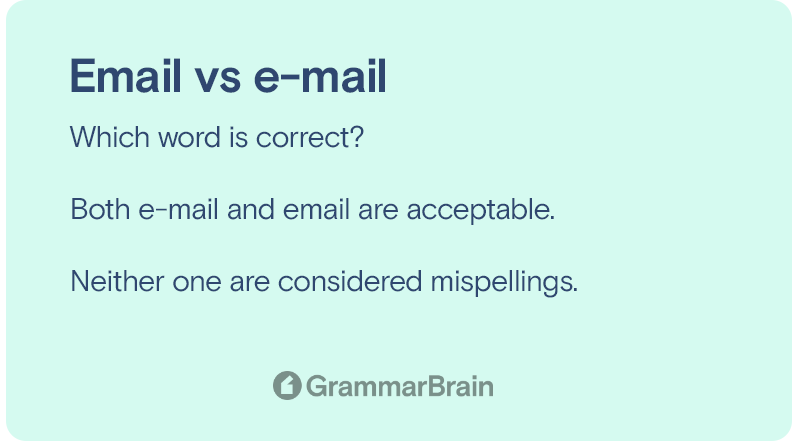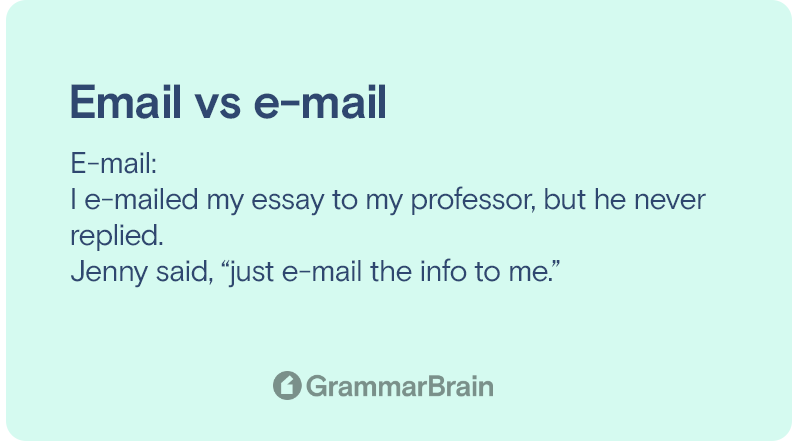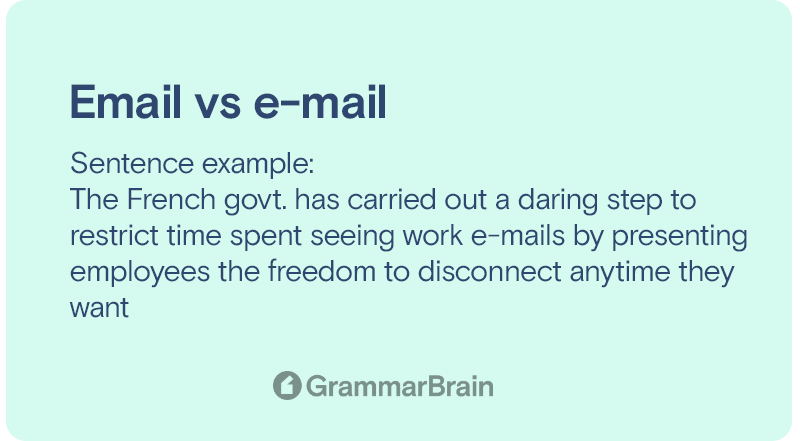Is it email or e-mail? In today’s digital era, communication has become instantaneous. Unlike before, now we don’t have to wait for long to receive any kind of information from a person. Electronic mail has completely changed human’s way of interacting with one another.
Now, this electronic mail which commonly describes digital messages often spelled e-mail and email. However, the question is should you spell the word e-mail or email? Many people get confused between the two spellings and debate the correct spelling.
Although the most preferred method is the hyphenated version than to spell email. However, the fact is both the spelling are correct and widely used all over the world.
So, let’s now go deeper into the topic to find out the difference between the two spellings and know which one is grammatically correct to use.

Which word is grammatically correct? E-mail or email?
The most familiar form of digital communication with messaging is the word e-mail. However, writers around the world spell it in different ways, like the word Email, email, and E-mail. So, let’s now find out which one is grammatically correct.
Why spell the word e-mail (with a hyphen)
Well, the word e-mail is sometimes treated as compound nouns and often as verbs.
E-mail as a compound noun is made using two different words—
- electronic
Thus, the e used in e-mail is simply an abbreviation for the word “electronic,” and it is used in plenty of other words including — e-learning, e-business, and e-commerce.
The general hyphenation rule in compound phrases that combine a number (or a single letter) and then a word has to hyphenate them. Thus, based on the traditional rule of hyphenation, the word e-mail is not only the most common form but also the correct form.

Here are a few instances:
- Finish your task as soon as possible and e-mail me the details
- I drafted an e-mail but forgot to send it on time
E-mail as a verb means to send any electronic message to someone. For instance:
- I e-mailed my essay to my professor, but he never replied.
- Jenny said, “just e-mail the info to me.”

Why spell the word email (without a hyphen)
Well, email is an e-mail’s variant spelling. Neither spelling is wrong, and both are also widely accepted.
The hyphenated version of the word e-mail is way more common than this unhyphenated version of the email. And the two words are correct and have widespread use. So, which spelling you are going to choose is entirely up to you.
Examples
So, how are you going to use the traditional word e-mail and the generally accepted and popular word email? Well, you can use both unless you need to stick to the style guides, it is entirely up to you if you use the particular term consistently.
Here are a few examples:
- The French govt. has carried out a daring step to restrict time spent seeing work e-mails by presenting employees the freedom to disconnect anytime they want
- I received your e-mail just now regarding your query about our services at your place. We will shortly revert to you.
- If you are interested in setting up a new business, do not forget to create an e-mail account to respond to your customers
- I have been using the same email ID and password for the last 6 years
- Can I email you the details after finishing my existing work?
- If you install a specialized email app, it will help you communicate with your client easily.
In Summary
The words e-mail & email both typically refer to electronic messaging, however, the word e-mail is way more commonly used than the word email. Even though the world is seemed to have moved on to settle on the newer and simpler spelling variant —email— but some very significant names in publishing and lexicography are still sticking with the traditional version, the word e-mail.
Thus, which one you prefer to use is entirely up to you. Hope this article helped you understand whether to prefer the word e-mail or email. The truth is that, unlike other e-words, this compound noun can be used in both ways.
FAQs
Which one is the correct one to use email or e-mail?
Should you hyphenate email?
In case you work for an agency or publication that chooses a particular style guide (AP Style/MLA), then you should choose your spelling of the word e-mail.
However, in case you don’t have to follow a certain style, choose your preferable spelling and simply stick with it. Because consistency throughout an author’s writing—particularly in publications—is the key matter.
Inside this article
Fact checked:
Content is rigorously reviewed by a team of qualified and experienced fact checkers. Fact checkers review articles for factual accuracy, relevance, and timeliness. Learn more.
Core lessons
Glossary
- Abstract Noun
- Accusative Case
- Anecdote
- Antonym
- Active Sentence
- Adverb
- Adjective
- Allegory
- Alliteration
- Adjective Clause
- Adjective Phrase
- Ampersand
- Anastrophe
- Adverbial Clause
- Appositive Phrase
- Clause
- Compound Adjective
- Complex Sentence
- Compound Words
- Compound Predicate
- Common Noun
- Comparative Adjective
- Comparative and Superlative
- Compound Noun
- Compound Subject
- Compound Sentence
- Copular Verb
- Collective Noun
- Colloquialism
- Conciseness
- Consonance
- Conditional
- Concrete Noun
- Conjunction
- Conjugation
- Conditional Sentence
- Comma Splice
- Correlative Conjunction
- Coordinating Conjunction
- Coordinate Adjective
- Cumulative Adjective
- Dative Case
- Determiner
- Declarative Sentence
- Declarative Statement
- Direct Object Pronoun
- Direct Object
- Diction
- Diphthong
- Dangling Modifier
- Demonstrative Pronoun
- Demonstrative Adjective
- Direct Characterization
- Definite Article
- Doublespeak
- False Dilemma Fallacy
- Future Perfect Progressive
- Future Simple
- Future Perfect Continuous
- Future Perfect
- First Conditional
- Irregular Adjective
- Irregular Verb
- Imperative Sentence
- Indefinite Article
- Intransitive Verb
- Introductory Phrase
- Indefinite Pronoun
- Indirect Characterization
- Interrogative Sentence
- Intensive Pronoun
- Inanimate Object
- Indefinite Tense
- Infinitive Phrase
- Interjection
- Intensifier
- Infinitive
- Indicative Mood
- Participle
- Parallelism
- Prepositional Phrase
- Past Simple Tense
- Past Continuous Tense
- Past Perfect Tense
- Past Progressive Tense
- Present Simple Tense
- Present Perfect Tense
- Personal Pronoun
- Personification
- Persuasive Writing
- Parallel Structure
- Phrasal Verb
- Predicate Adjective
- Predicate Nominative
- Phonetic Language
- Plural Noun
- Punctuation
- Punctuation Marks
- Preposition
- Preposition of Place
- Parts of Speech
- Possessive Adjective
- Possessive Determiner
- Possessive Case
- Possessive Noun
- Proper Adjective
- Proper Noun
- Present Participle
- Prefix
- Predicate



